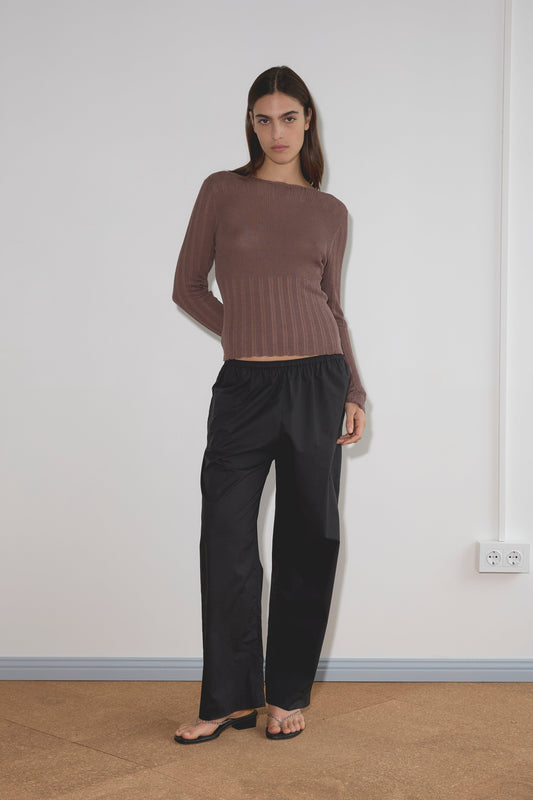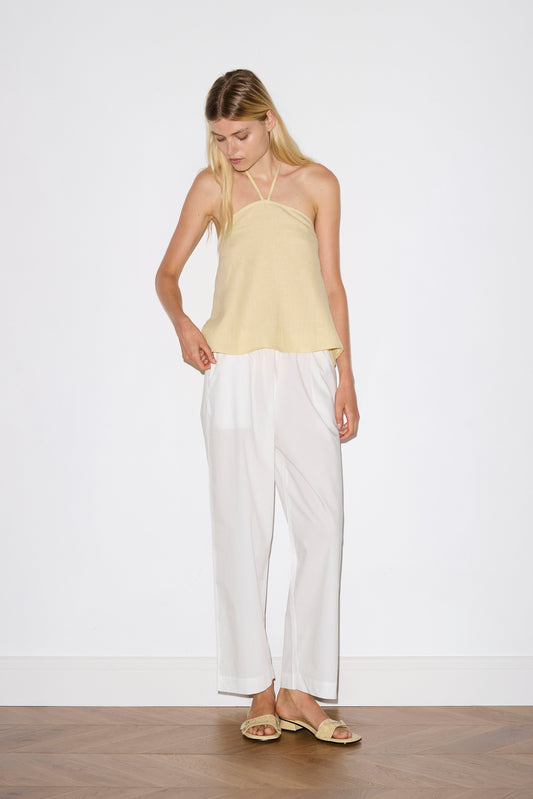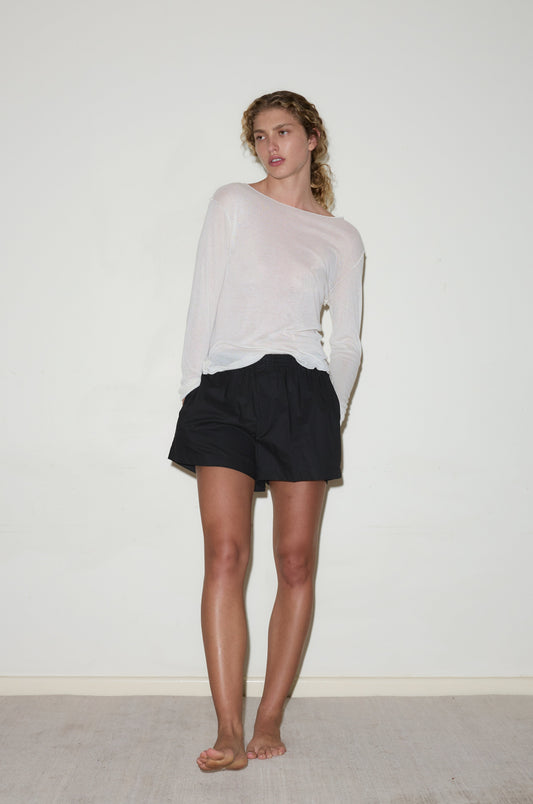Ethics and Sustainability
1. ETHOS
At Deiji Studios, sustainability and social conscience is considered in all areas of our company.
2. RESPONSIBILITY
At Deiji Studios, we hold a firm commitment to ethical and sustainable practices. Our fabrications are made entirely from biodegradable or recycled materials, produced by our skilful manufacturers in China, with whom we engage daily. As proud 1% for the Planet members, we donate 1% of our annual profits to environmental organisations, extending our commitment to making a positive impact in the broader community.
We continue to learn and evolve, finding better practices and more efficient ways of doing this as we grow. Thank you for joining us as we learn to make a positive impact for a more sustainable future.

3. COMMITMENTS
THREAD TOGETHER
Thread Together are an Australian non-profit dedicated to addressing both clothing insecurity and textile waste. Through our donations of new, unsold garments, we help provide clothing to people who need it most. These items are sorted by volunteers and delivered through Thread Together’s mobile wardrobes and national network of charities, reaching communities across Australia. By partnering with Thread Together, we’re able to give our clothing a meaningful life - helping restore dignity and hope to individuals and families experiencing homelessness, domestic violence, or the impact of natural disasters.
CARBON POSITIVE AUSTRALIA
Since 2020, we’ve proudly partnered with Carbon Positive Australia, making annual donations to support their ecosystem restoration and community forest projects. We also subscribe to their Carbon Positive Solutions program as part of our ongoing commitment to offset our Scope 1 and 2 emissions in Australia. Through this continued support, we’re helping to fund initiatives that draw down carbon, protect biodiversity, and regenerate vital natural environments.
Previously we have also supported the following charitable organisations: Wires, Seed Indigenous Youth Climate Network, World Central Kitchen, California Community Foundation, Global Empowerment Mission, Care International, Karrkad Kanjdji Trust, Hawai’i Community Foundation, Humane World for Animals, Worn for Good, NSW SES, Oz Harvest, GIVIT and Good360.

4. FABRICATION
Our collections are designed using a considered selection of natural and lower-impact fibres, including organic hemp, a recycled polyester and Lenzing Ecovero viscose blend, RWS certified wool, GRS certified recycled polyester, 100% wool, and where possible we source GOTS and OEKO-TEX certified French linen, and GOTS certified organic cotton poplin and jersey. Our factories are required to provide valid SCOPE Certifications for each collection. These fabrics are either biodegradable or made from recycled materials.
LINEN
We use European Flax Certification to ensure complete traceability, meeting EU Eco Label Certification and traceability from seed to dispatch, guaranteeing premium quality linen grown in France. European Flax produces zero waste as the whole plant is used and is grown without the use of fertilisers or pesticides, using just rainwater, requiring no additional irrigation and resulting in low water consumption. According to a report by the Institute for Water Education (IWE) of UNESCO, producing 1 kg of flax fibres requires roughly three times less water, compared to cotton fibres. The result is a breathable, hypoallergenic, and environmentally friendly fabric, signature to our collections. Where possible, our linen is 100% certified organic by the Global Organic Textile Standard (GOTS), free from harmful chemicals and 100% certified by OEKO-TEX Standard 100.
COTTON
Where possible, our cotton is 100% certified organic by the Global Organic Textile Standard (GOTS) to minimise environmental impact, foster a safer working environment, and promote biodiversity. According to Textile Exchange's 2021 Organic Cotton report, organic agricultural practices enhance soil carbon, reduce greenhouse gas emissions, lower the risk of groundwater pollution by prohibiting the use of chemicals, and save energy by avoiding the use and manufacturing of synthetic inputs. Well-managed organic systems retain more water compared to conventionally managed soil. Globally, 80 percent of organic cotton is cultivated in rainfed conditions, preserving natural water sources rather than relying on irrigation. Light, airy, and durable, our organic cotton poplin stands as a collection staple for versatile dressing.
ORGANIC HEMP/GOTS COTTON JERSEY
Softly weighted, strong, and hypoallergenic, our Hemp/Cotton blend forms the foundation of our Jersey range, sourcing GOTS organic cotton where possible. Cultivated in the mountains of Northern China, hemp requires little land and water to grow whilst yielding large amounts of fibre with zero waste. Hemp is naturally pest resistant so requires little to no use of pesticide or fertiliser. Hemp crops have positive effects on the diversity of agricultural ecosystems and landscapes, requiring no irrigation, helping to renew the soil and capture CO2, offering a welcomed pause for the quality of the soil.
FINE RIBBED KNIT
For comfortable light layering, our Fine Ribbed Knit is soft to touch and carefully woven from 85% GRS recycled polyester, diverting plastic from landfill, and 15% Lenzing Ecovero viscose, reducing emissions and water impact by 50% compared to generic viscose.
SUSTAINABLE KNIT BLEND
Our sustainable wool blend knitwear is made from RWS certified wool and GRS certified recycled polyester made from reclaimed fishing nets. The Responsible Wool Standard (RWS) is an industry tool designed to recognise the best practices of farmers, with the aim of improving sheep welfare and preserving land health. An RWS certification ensures from farm to the final product that animal welfare, progressive land management, and social welfare standards have been met, with credible auditing in each stage of the supply chain. The Global Recycled Standard verifies the recycled content in products, assures they are processed in a more climate-friendly way, and aims to reduce the harmful impact of production on people and the environment.
WOOL
Most of our tailored pants and shirts are crafted from 100% Responsible Wool Standard (RWS) certified wool, offering a soft hand feel, natural breathability, temperature regulation, and odour resistance. The RWS is a voluntary global certification that ensures every stage of the supply chain - from wool farms through to the final business-to-business transaction - meets defined criteria. Certified farms and ranches are assessed against strict requirements relating to animal welfare, land stewardship, and social responsibility. Wool is a fibre with a naturally low environmental impact; it requires minimal care, and is 100% natural, renewable, recyclable, and biodegradable.
RECYCLED POLYESTER
Integrated into our knitwear and quilted styles, all polyester is 100% post-consumer recycled, and GRS certified. The Global Recycled Standard (GRS) is an international certification that establishes requirements for third-party verification in the production of items using recycled materials, with the goal of minimising adverse social, environmental, and chemical effects.
TENCEL
We use Tencel for its softness, breathability, moisture control, and drape - qualities that bring lasting comfort to our collections. Tencel’s sustainable and biodegradable nature, along with its closed-loop production process, reflects our commitment to responsible manufacturing and allows us to offer products that align with our values and those of our community.
OTHER MATERIALS
Deiji Studios currently use metal hardware such as zippers, studs and d-rings, plastic button closures, garment tags composed of recycled polyester or cotton, and garment elastic composed of polyester.

5. MANUFACTURING
We consciously manufacture our product in China and last visited our factories in December 2023.
We are committed to working together with our factories to enrich the lives of those who work on our garments and support their local communities. Ensuring all workers receive a fair living wage, reasonable working conditions, and adequate hours is of utmost importance to us. This helps cover essential needs such as food, water, accommodation, education, medical care, clothing, transport, and other essential needs.
Given the importance we place on the environment and our impact, we personally visit our factories to ensure this core value is upheld in the production of our garments. We work with our factories to better their yearly audits, and workshop any improvements we would like to see on a case-by-case basis. All suppliers have signed and agreed to our code of conduct and environmental policies. Our factories are careful to control the amount of fabric ordered for each collection and follow environmentally friendly waste management processes where any left-over fabrics are re-used or re-cycled. Most of our factories are powered using hydroelectric and solar power and are encouraged to implement renewable energy resources where possible.

6. MODERN SLAVERY STATEMENT
We are committed to upholding good labour standards and protecting the human rights of all individuals employed as a result of Deiji Studios' business. We ensure all employees receive fair wages, proper compensation, and work under pre-approved conditions. We do not condone Modern Slavery in any form, including the use of violence, deceit, threat, or coercion to recruit workers into forced or bonded labour, descent-based labour, child labour or any behaviour that undermines the freedoms or rights of a human being.
7. BIODEGRADABLE AND RECYCLED PACKAGING
In place of conventional plastic, all product arrives at our warehouse in glassine bags made from glassine paper that is recyclable, or PBAT packaging made from renewable resources such as sugar cane and cornstarch, both of which are designed to be biodegradable and home compostable. We use FSC certified recycled paper for our postcards, invoices, and swing tags, which are tied to garments using natural cotton rope, eliminating the need for unnecessary safety pins, and our envelopes are composed of FSC certified glassine paper. Our orders are then packed and dispatched in recycled plastic mailer satchels, made from recovered ocean plastic pollution.

8. FUTURE
We are committed to continually improving our environmental practices, from reducing waste in our design and production processes, to increasing the use of recyclable and biodegradable materials.
While we recognise there is always more to do, we aim to grow with openness and accountability as we navigate more responsible ways of making.
If you have suggestions on how we can improve our product, process or service, we welcome your feedback.




